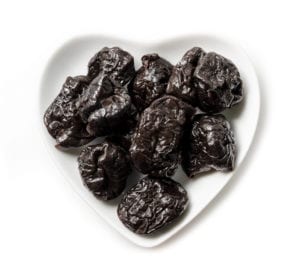Written by Jessica Patella, ND. Study results indicate that daily consumption of 50-100 grams of dried plums may improve cardiovascular risk factors in healthy postmenopausal women by increasing antioxidant capacity.
 Cardiovascular disease is the leading cause of death in the United States with an estimated annual cost of $219 billion 1,2. In postmenopausal women, the decline of estrogen significantly increases their risk for cardiovascular disease 1,3. Previous studies have shown the high polyphenol and fiber content of dried plums may reduce the risk factors for heart disease 1,4. A recent study was one of the first to investigate the effects of dried plums on multiple risk factors in postmenopausal women 1.
Cardiovascular disease is the leading cause of death in the United States with an estimated annual cost of $219 billion 1,2. In postmenopausal women, the decline of estrogen significantly increases their risk for cardiovascular disease 1,3. Previous studies have shown the high polyphenol and fiber content of dried plums may reduce the risk factors for heart disease 1,4. A recent study was one of the first to investigate the effects of dried plums on multiple risk factors in postmenopausal women 1.
The research included 48 postmenopausal women from 65-79 years of age. The participants were randomly divided into three groups: 0g/day (n=16), 50g/day (about 5 prunes; n=16), 100g/day (about 10 prunes; n=16) of dried plums for 6 months. Participants were instructed to keep the rest of their diet the same.
The results were as follows:
- Consuming 100g/day significantly reduced total cholesterol (P=0.002) compared to baseline.
- Consuming 50g/day significantly increased HDL-C (“good”) cholesterol compared to baseline (P=0.005), this also resulted in a lower total cholesterol to HDL-C ratio (P=0.014).
- Inflammatory markers improved in the 50g/day group, with a significant reduction in Interleukin-6 (IL-6; P=0.044) and Tumor Necrosis Factor-alpha (TNF-a; P=0.040).
- Total antioxidant capacity increased significantly in the 50g/day group (P=0.046) compared to baseline.
- Superoxide dismutase activity (a protector from free radical damage) increased significantly in both the 50g/day (P=0.044) and 100g/day groups (P=0.027) compared to baseline.
- Liver functioning also showed improvement in the 50g/day group with significant decreases in alanine transaminase (ALT; P=0.046), lactate dehydrogenase (LDH; P=0.039) and creatine kinase (CK; P=0.30) compared to baseline.
These results indicate 50-100g of dried plums per day can improve cardiovascular risk factors 1. Oxidative stress has been suggested in the development of cardiovascular disease 5. Dried plums are high in antioxidants, due to their high polyphenol content 1,6. The researchers of the study suggest that the daily consumption of dried plums and the antioxidant activity may be the protective effect lessening the cardiovascular risk factors, since the dried plums would reduce oxidative stress 1.
In conclusion, daily consumption of 50-100 grams of dried plums may improve cardiovascular risk factors in healthy postmenopausal women by increasing antioxidant capacity 1. The lower dose of 50g/day produced additional benefits, suggesting a lower dose maybe better and more easily tolerated due to the reduced digestive effects 1.
Source: Mee Young Hong, “Dried Plum Consumption Improves Total Cholesterol and Antioxidant Capacity and Reduces Inflammation in Healthy Postmenopausal Women” published in the Journal of Medicinal Food before print 2021.
Click here to read the full text study.
Posted August 18, 2021.
References:
- Hong MY, Kern M, Nakamichi-Lee M, Abbaspour N, Ahouraei Far A, Hooshmand S. Dried Plum Consumption Improves Total Cholesterol and Antioxidant Capacity and Reduces Inflammation in Healthy Postmenopausal Women. J Med Food. 2021.
- CDC. Heart Disease Facts. 2021; https://www.cdc.gov/heartdisease/facts.htm. Accessed 8/15/21.
- Sathyapalan T, Aye M, Rigby AS, et al. Soy isoflavones improve cardiovascular disease risk markers in women during the early menopause. Nutrition, metabolism, and cardiovascular diseases : NMCD. 2018;28(7):691-697.
- Khurana S, Venkataraman K, Hollingsworth A, Piche M, Tai TC. Polyphenols: benefits to the cardiovascular system in health and in aging. Nutrients. 2013;5(10):3779-3827.
- Csányi G, Miller FJ, Jr. Oxidative stress in cardiovascular disease. Int J Mol Sci. 2014;15(4):6002-6008.
- Kayano S, Kikuzaki H, Fukutsuka N, Mitani T, Nakatani N. Antioxidant activity of prune (Prunus domestica L.) constituents and a new synergist. J Agric Food Chem. 2002;50(13):3708-3712.

